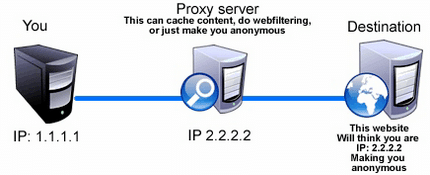Proxies are a tool that can be used by your computer. This tool protects you as well as your information. Proxies act as the barriers such that you can view websites and acquire information, while your information is kept secret. The proxy server filters out requests, acting as a third party.

The simple key steps for proxy servers at basic level
- The user connects to proxy server.
- Requests a service or some information such that this may be to a specific file or website or even some other resource.
- Proxy servers fulfill the request by filtering guidelines.
- The request is verified and sent to the server.
- The file or information is acquired and sent to the user.
Proxy servers are for security purposes, they block access and to help in internet filtering rules, thus they primarily block sites containing material that users want it to be blocked.
A proxy server also can help for malware to prevent your network from getting a virus or being hacked.Businesses employ proxy servers to protect data or information or any leaks of employee usage. Proxy servers work in different ways and there are several types of proxies having a specific purpose.
Types of proxies by specific purpose
- Caching Proxy Server: This proxy server speeds requests as your older request is saved. A catching proxy server retains the resources of the user that is requested frequently. Thus, it has positive impact on usage and bandwidth cost, besides it improves performance and speed.
- Web Proxy: A web proxy primarily helps to bypass block websites. The logs get produced typically giving information on specific websites that are used by users and also monitors the usage on overall bandwidth.
- Anonymizing Proxy Server: This proxy server’s key purpose is to make web surfing anonymous. Regardless of whether this proxy server is in place or used to access sites by users to share information. However, the actual proxy server is sure to have the user access information.
- Hostile Proxy: This proxy helps in capturing information of the web pages that users visit of even fill forms out.
- Reverse proxy: This proxy retrieves resources on behalf of a client from one or more servers. That prevents unwanted access coming from the internet to your private network. That’s great for you security of your server.
- open proxy, is a server that is accessible to all internet users. There are “thousands of thousands” of open proxies on the internet. It’s Free but really slow.
Proxy Servers are of vital use to businesses such as the marketing companies so that they promote their data handling capabilities. There are limits receiving servers coming from an IP address. This method adds to exchange capabilities and data handling and of companies that lack an army of ready servers at all times.
There are other less common proxy servers also available. Eventually, at the day end, a proxy server is used typically to limit the information accessed or even to track the user’s usage. Primarily, this proxy server is used in a business setting and is appropriate for a home setting as well, especially when parents wish to restrict their children’s access to offensive information or material. The main purpose of proxies and proxy servers is to offer privacy and security.
Proxies offer you anonymity and security
Finally, few things to bear in mind while using proxies are:
- As proxy server offer you anonymity and security, proxies itself decodes traffic and so it can see all that you do, unless you choose SSL connections.
- Using free anonymity or private proxies also helps, but cannot be trusted completely, so look for an appropriate proxy server that offers you anonymity, security and also allows surfing the net in good speed with no down or slow connection.

One thought on “Proxy offer anonymity and security – What are proxies?”